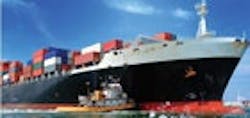Canada Works to Cut Pollution From Shipping, Improve Safety Standards for Workers
The Government of Canada announced that Canada is taking important steps to help reduce air and water pollution from ships in Canadian waters, and ensure the safety of vessels, goods and workers.
The government will ratify international conventions related to marine pollution and maritime safety, which builds on other actions taken, including introducing the Clean Air Act in 2007, passing legislation to hold ship owners more accountable for environmental disasters and doubling Canada's jurisdiction over Arctic waters.
"Ratifying these conventions will demonstrate Canada's commitment to adopting uniform international standards for maritime safety and protecting the marine environment," said the Hon. Lawrence Cannon, minister of foreign affairs. "Our government is taking action to protect public health, the environment and biodiversity, and to promote fair labor standards here and abroad."
The ratified International Maritime Organization and International Labor Organization conventions will aim to reduce air and water pollution; better protect the marine environment and biodiversity; ensure the safety of vessels, goods and workers onboard; create economic opportunities for Canadian companies; and enhance the competitiveness of Canadian ships.
Specifically, the International Maritime Organization conventions aim to make a tangible contribution to reducing marine pollution from ship sewage, garbage and environmentally harmful paints; controlling atmospheric emissions from ships; and improving ballast water management (to reduce the risk of releasing invasive aquatic species into Canadian waters).
The conventions were tabled in the House of Commons on Oct. 9, 2009, followed by a period of 21 sitting days to inform members of Parliament and to give the House of Commons an opportunity to comment on the treaties. The 21 sitting days ended on Nov. 23, 2009, and the government will now proceed to bring them into force.
Source: Transport Canada
